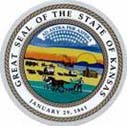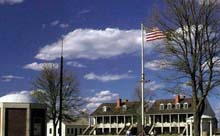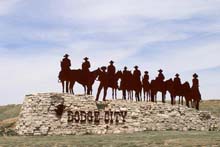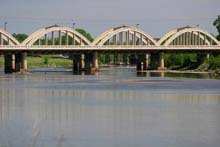About Kansas
Kansas is a Midwestern state in the Central United States. The state is named after the Kansas River that flows through it, which in turn derived its name from the Siouan word Kansa meaning “People of the south winds.”
Located in the heartland of the country, Kansas is home to the geographical center of the contiguous United States. Historically home to large numbers of Native Americans who hunted buffalo there, the state was first settled by white Americans in the 1850s. Beginning in 1854, abolitionists from New England and pro-slavery settlers from neighboring Missouri rushed to the territory to determine if Kansas would become a free state. Known as Bleeding Kansas, the state was a hotbed of violence and chaos in its early days as these forces collided. On January 29, 1861 Kansas entered the Union as a free state. After the Civil War, the population of Kansas exploded after wave of immigrants turned the prairie into productive farmland. Today, Kansas is one of the most productive agricultural states, leading the nation in wheat production.
The state, lying in the great central plain of the United States, has a generally flat or undulating surface, and on a large scale appears almost perfectly flat. The Missouri River forms nearly 75 miles of the state’s northeastern boundary. The Kansas River, formed by the junction of the Smoky Hill and Republican rivers at appropriately-named Junction City, joins the Missouri at Kansas City, after a course of 150 miles across the northeastern part of the state. The Arkansas River, rising in Colorado, flows with a tortuous course for nearly 500 miles across three-fourths of the state.
Kansas is the nation’s second largest producer of beef cattle, behind only Texas. Kansas is one of the most productive agricultural states, leading the nation in wheat production. Kansas ranks 8th in U.S. oil production. Production has experienced a steady, natural decline as it becomes increasingly difficult to extract oil over time. Kansas also ranks 8th in U.S. natural gas production. Similar to oil, production has steadily declined since the mid-1990’s with the depletion of the Hugoton natural gas field—the state’s largest field which extends into Oklahoma and Texas.
Kansas has a reputation as a progressive state with many firsts in legislative initiatives—it was the first state to institute a system of workers compensation (1910). Kansas was also one of the first states to permit women’s suffrage in 1912. Suffrage in all states would not be guaranteed until ratification of the 19th Amendment to the U.S. Constitution in 1920. The council-manager government was adopted by many larger Kansas cities in the years following World War I while many American cities were being run by political machines or organized crime. Kansas was also at the center of Brown v. Board of Education of Topeka, a 1954 Supreme Court decision that banned racially segregated schools throughout the U.S.
Since the 1960s, Kansas has grown more socially conservative. The 1990s brought new restrictions on abortion, the defeat of prominent Democrats, including Dan Glickman, and the Kansas State Board of Education’s infamous 1999 decision to eliminate the theory of evolution from the state teaching standards, a decision that was later reversed. In 2005, voters accepted a constitutional amendment to ban same-sex marriage. The next year, the state passed a law setting a minimum age for marriage at 15 years. On November 8, 2005, The Kansas State Board of Education, at the urging of intelligent design advocates, voted to add criticisms of evolution to the state science standards. However, the Manhattan-Ogden school board has voted to reject the standards, and several board members who supported those standards were defeated for reelection in 2006.
$state_id = ‘KS’ ;
global $state_id ;
[/insert_php]
[insert_php]
$state_id = ‘KS’ ;
[/insert_php]








